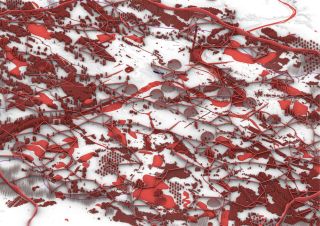PragueNext
LS 2024
Zadání
The Why Factory continues to explore the pasts, presents and futures of the Czech Republic. Building on the research of CZ2, developed at CTU in 2023, the upcoming studio PragueNext will direct its gaze towards the future of the Czech capital.
As geopolitical shifts in and around Europe reposition the balances within its union, the role of its central and eastern parts in particular grows in relevance. At the same time, the challenges of nation-states (rapid migration, a rise of right-wing nationalism, …) might lead us to place our faith in cities, rather than countries, as the societal design space for a desirable future. But what should such a future look like? And how could it be designed? Can we be equally bold and cautious, imaginative and analytical?
Prague provides an ideal testing ground to explore these questions: A city in the geographical as well as historical heart of Europe. A city regarded as timeless by tourists, while actually in constant motion. In particular, Prague’s rapid urban development and the urgency to grow further simultaneously pose risks and offer opportunities.
- How can these urgencies be utilised productively to improve the city?
- What qualities can we use to improve the city and patch the places where it may fall behind?
- How good is Prague? And how can we even measure its goodness?
- How does Prague compare to surrounding similarly sized and/or populated cities?
- Could Prague become a European capital?
- Are current and planned urban developments consistent enough to lead towards a more connected city? Or is Prague’s characteristic juxtaposition of fragments a recipe for the European city of the 21st century? A ‘citta analoga’ to the max.
Let us explore these questions together!
The studio will be structured as a semester-long collective process with the goal of producing a comprehensive study of the past and present as well as possible futures of Prague. Students will work in smaller groups, each looking at the city through a specific lens, while perpetually aligning within the collective group to produce a single final project. Some of the possible analytical lenses are listed below, whilst others will potentially be added throughout the research process.
-
Urban Vacancy & Ownership
-
Heritage & Memory
-
Zoning & Land-Use
-
Infrastructure & Mobility
-
Greenery & Ecology
-
Tourism & Fringe
-
Industry & Agriculture
-
Growth & Density
-
Archipelagos & Crosshatches
-
Planned Proposals & Visions
In a highly collaborative process, students will employ data-driven techniques for quantitative and qualitative analysis as well as world-building methodologies. Together they will research and develop metrics to measure Prague and compare it to other cities. The research phase will be followed by the design of diverse scenario-based interventions ranging in scale from a bench to a masterplan. These spatial scenarios will respond to specific questions uncovered during analysis by reimagining the city and evaluating these proposed futures. To highlight the collective nature of the project, all proposals will be visualised within a single shared virtual model through a range of media and techniques, and complemented by a research report in book format. The results will be the basis for a collective exhibition in the faculty’s atrium and a publication in the summer of 2024.
Organisation
Tutors: The Why Factory: Prof. Winy Maas, Leo Stuckardt, Jaka Korla, Barbora Rozálie Strnadová, Michal Zapletal
The studio runs from the 19th of Feb to the 26th of May with weekly reviews on Monday and Friday. We will have a mid-review and a final review with an external jury, dates TBD. Kick-off is a four-day workshop at the Palace Desfours.
Collective studio reviews are twice a week with tutors on:
- Mondays from 14:15 to 17:00
- Fridays from 13:00 to 17:00 (with 9:00 to 12:00 reserved for group work preparation in-studio)


